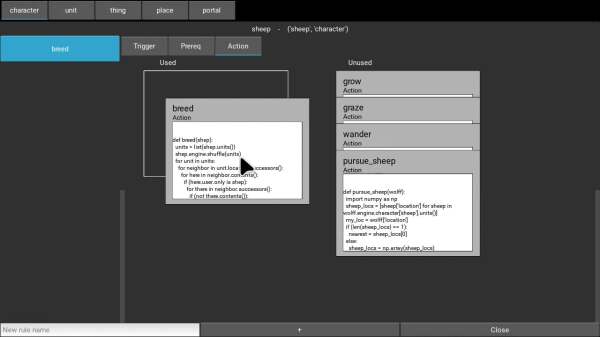New instance, new #introduction
I messed around with a lot of old Maxis games as a kid and kind of expected more would come out that would teach me how the world "really worked" in a way I could use to decide how to live my life. I still don't know what that would be like, exactly, but I figure *somebody* does, so I'm making a tool to help them, whoever they are: the Life Simulator Engine, #LiSE, pronounced "lies".
The core feature is time travel. The development kit for Inform 7 had this, and it seemed so obviously useful that I needed to have it. This replaces save files; now, everything that ever happened in any playthrough of your game lives in a database.
There's also a rules engine, similar to the one in Ren'Py's Dating Sim Engine. By compartmentalizing the complexity of your game's rules, it should make them easier to reason about, and there's a way to time travel to just before or after any particular rule, to see if it did the right thing.
Take a look:
https://vimeo.com/815795673
I messed around with a lot of old Maxis games as a kid and kind of expected more would come out that would teach me how the world "really worked" in a way I could use to decide how to live my life. I still don't know what that would be like, exactly, but I figure *somebody* does, so I'm making a tool to help them, whoever they are: the Life Simulator Engine, #LiSE, pronounced "lies".
The core feature is time travel. The development kit for Inform 7 had this, and it seemed so obviously useful that I needed to have it. This replaces save files; now, everything that ever happened in any playthrough of your game lives in a database.
There's also a rules engine, similar to the one in Ren'Py's Dating Sim Engine. By compartmentalizing the complexity of your game's rules, it should make them easier to reason about, and there's a way to time travel to just before or after any particular rule, to see if it did the right thing.
Take a look:
https://vimeo.com/815795673

LiSE demo 0.14.0
Demonstration of the Life Simulator Engine. Learn more at https://github.com/TacticalMetaphysics/LiSEVimeo
This entry was edited (2 years ago)
Hypolite Petovan
•It didn’t go anywhere and I’ve since learned enough about the world to resign to the fact that it can’t be explained with simulations.
some kind of orange shape
•All of our climate models are wrong, but some are useful
some kind of orange shape
•Green New Deal Simulator – Release Notes – Molleindustria
www.molleindustria.org